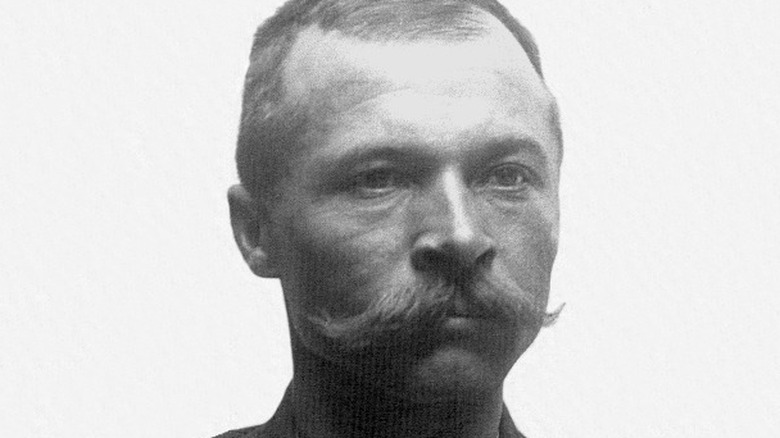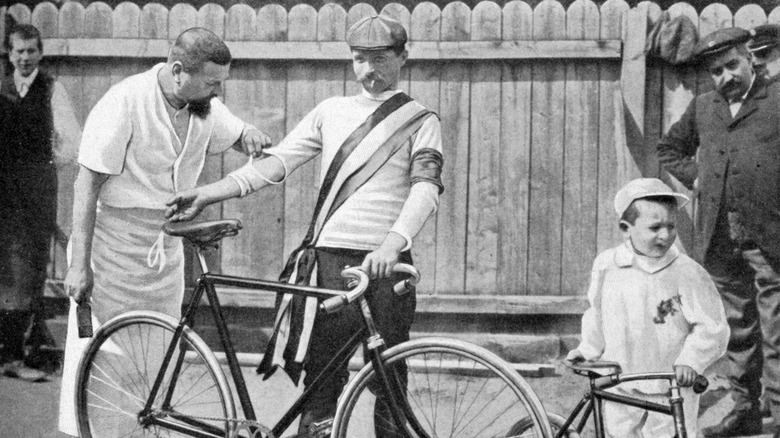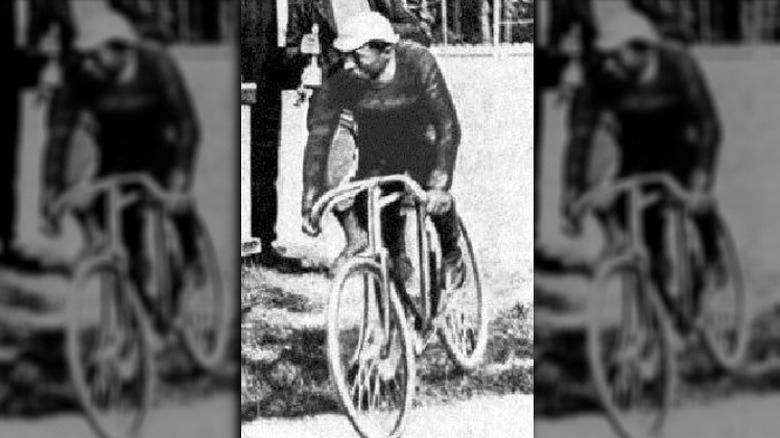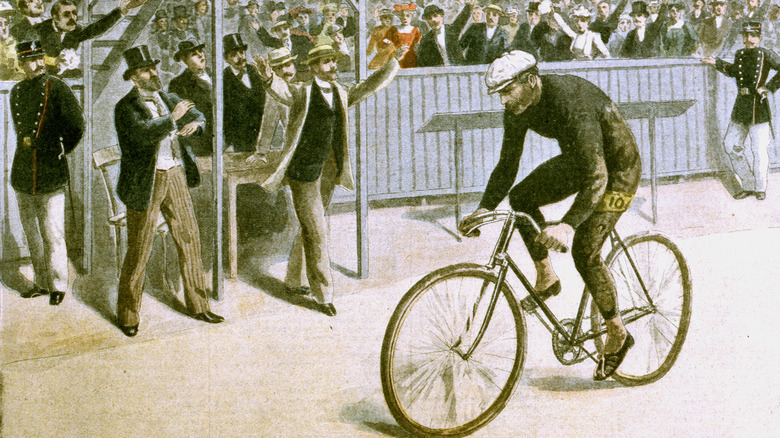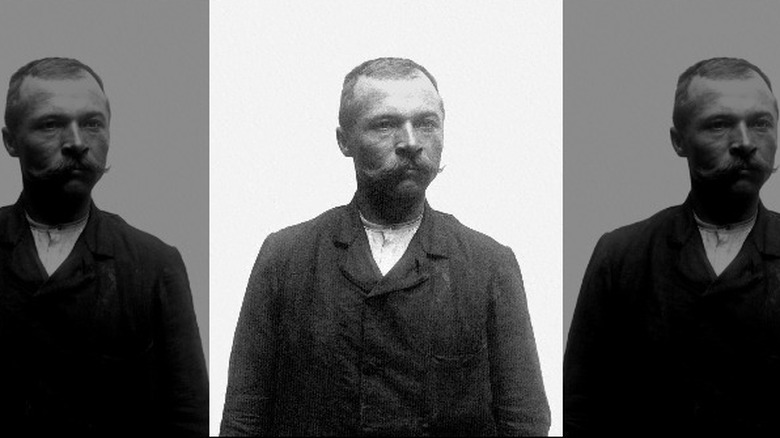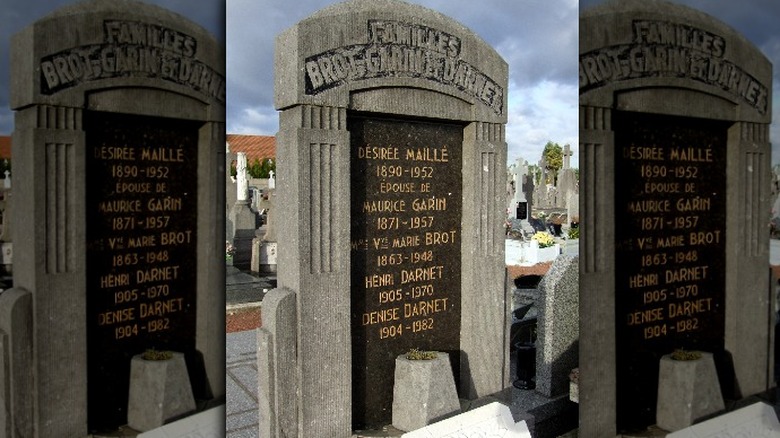The Untold Truth Of The First Tour De France Winner, Maurice Garin
In 1903, Maurice Garin became the first winner of the Tour de France. One year later, he became the second winner of the Tour de France and the first to lose his title amid accusations of cheating.
A native of Arvier, Italy, Maurice-François Garin was born in 1871. As reported by WBUR, Garin was a small child, who was thin and short in stature. According to legend, Garin's parents took advantage of his small size to smuggle him into France — where he was promised work as a chimney sweep. In an interview with WBUR, historian Peter Crossin said Garin's parents were given "a big piece of cheese" as a down payment for their son's services.
Although he spent several years working as a chimney sweep, and subsequently earned the nickname "The Little Chimney Sweep," WBUR reports Garin also worked as a delivery boy in northern France. As was customary at the time, Garin made his deliveries on a bicycle. In the mid to late 1800s, Garin realized he was skillful and fast on a bicycle. He also started to enjoy riding his bicycle for sport in addition to making his deliveries.
Garin entered his first bicycle race in 1890. However, the race was only open to professionals. Determined and undeterred by the rules, Garin joined the race moments after the official start. Garin sped past all the other competitors and ultimately won the race.
The birth of the Tour de France
Although Maurice Garin won the race, he was disqualified because he was not an official entrant. Therefore, as reported by WBUR, he was not eligible for the 150-france prize.
Between 1892 and 1903, Maurice Garin legitimately participated in 11 races in Italy and France. As reported by Cycling Ranking, Garin placed in the top 10 in eight of those races and won the Paris-Roubaix in 1898.
Prior to 1903, bicycle races were run in a point-to-point form. However, the proposed Tour de France would be run in stages over a period of 19 days. As reported by WBUR, the grand prize was 3,000 francs, which was nearly three times the average annual salary at the time.
History reports the Tour de France was created by journalist Geo Lefevre, who wanted to feature the race in his L'Auto sports newspaper. Lefevre hoped the news surrounding the unconventional race would increase his subscriptions and ultimately save the struggling publication.
L'Auto editor Henri Desgrange, who was a former champion cyclist, worked with Lefevre to organize the 1,500-mile race, which would begin in Paris and pass through Lyon, Marseille, Toulouse, Bordeaux, and Nantes, before returning to Paris. As reported by History, each stage of the race was an average of 250 miles and the cyclists were scheduled for one to three days of rest between each stage.
Unlike the modern Tour de France, the first race was conducted on unpaved roads.
Maurice Garin begins with an unfair advantage
History reports the first Tour de France cyclists rode as individuals and were not on teams. They also did not wear helmets, did not have the assistance of support cars, and were responsible for repairing their own bicycles.
As reported by WBUR, only 10 of the participants in the inaugural Tour de France were professional cyclists. The others were hobbyists, who simply wanted a chance at the generous prize money.
Although teams were prohibited in the first Tour de France, Maurice Garin partnered with several other riders, who called themselves "La Française." WBUR reports the group vowed to work together throughout all six stages of the race. However, four of the riders broke from the group during the fifth stage.
Historian Peter Crossin said Garin was already leading the race at that point, and he told his three companions that he planned to win the fifth stage as well. Another racer, Fernand Augereau, reportedly replied, "I think I can win. Why should I let you win?"
WBUR reports Garin told one of the members of his group to "knock Augereau off his bike." Although Augereau faltered, he got back on his bicycle and re-joined the race. Garin reacted by telling the same man to push Augereau over again. The man complied with the request, but Garin was worried Augereau would simply get back up and continue riding.
Determined to win the race, Garin took things into his own hands.
Winning the first Tour de France
To prevent his challenger from completing the race, Maurice Garin grabbed Augereau's bike and began "jumping up and down on his wheels and smashing them to pieces, rendering the bike completely useless." WBUR reports Garin's abhorrent behavior was witnessed by several other participants. One of the racers was so disturbed, he gave his own bike to Augerau so he could at least complete the race.
The first stages of the race were not well attended. However, by the last stage, Cossins said "Parisians turned out in the tens of thousands ... They could barely get the road clear before the riders came through."
Although he cheated, Garin ultimately won the inaugural Tour de France, and his contempt for the rules was overlooked. "They wanted to portray him as this heroic athlete who was doing everything in the right way, to be a kind of stereotype of French manhood — of being upright and honest and strong," Cossins said. As reported by WBUR, Henri Desgrange and Geo Lefevre also counted on Garin's success, and his perceived good reputation, to sell their newspapers and to ensure the Tour de France would become an annual event.
Despite the fact that it was essentially ignored by the race's organizers and the local media, Garin's cheating did not go unnoticed. In fact, getting away with it only encouraged the riders, including Garin, to cheat even more during the second Tour de France.
Maurice Garin wins, then loses
WBUR reports the long stretches of night racing helped facilitate the cheating, as it was simply too dark for anyone to see what was happening. "There were riders throwing tacks down, nails and other stuff on the roads ... There were people getting onto trains and jumping between cities on trains," Cossins said. "There were riders getting towed by motor bikes and motor cars."
During the last stage of the second Tour de France, Paris was struck with a heavy rainstorm. The cyclists and organizers both agreed to forgo the last kilometer of the race. Although Hippolyte Aucouturier was named the winner of the last stage, Maurice Garin was the overall winner.
Despite reports of cheating, Cycling Archives reports the organizers of the race were "happy with the original result." However, the Union Vélocipédique Française, or the UVF, received multiple complaints from the participants and subsequently launched an investigation into the accusations of cheating. At the conclusion of their investigation, 12 participants, including Garin, were ultimately disqualified.
As reported by Cycling Archives, Garin refused to acknowledge his disqualification. Instead, he insisted he was the "rightful winner" of the first and second Tour de France.
After a seven-year break, Garin raced in the Paris Brest, where he ranked 10th, and the Circuit de Touraine, where he ranked 11th. Those two races, which were in 1911, were his last.
Garin's racing career ends
Throughout his racing career, Cycling Ranking reports Maurice Garin was awarded the Tour badge, the Rider of the Year badge, nine Rider of the Year Italy badges, a Rider of the Year France badge, three Tour Stage badges, six Maillot Jaune badges, two Roubaix badges, six Anciens badges, an Endurance badge, and 14 Victory badges. His current overall rank is 633.
Following his retirement from racing, Garin opened a gas station. As reported by WBUR, Garin's gas station was popular with motorists, as the former cyclist would often share stories about his racing days while he was filling their tanks. Cossins said Garin ran his gas station for more than 40 years. In addition to earning enough to support his family, Garin seemed content with his new life and the memories he made while racing. As reported by Cyclist, Garin also opened a small bicycle shop, which sold bikes that Garin personally designed.
Garin died in 1957 at the age of 85. His accomplishments were commemorated with the construction of the Stade Vélodrome Maurice Garin. As reported by Sensettee, the original building was demolished and rebuilt in 1990. However, it is currently operated by the Minister of Youths and Sports.
